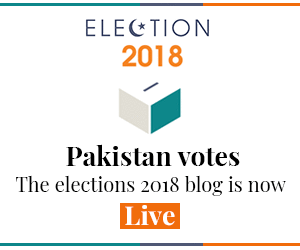
IT is perhaps not surprising given the many contradictions of Pakistani state and society that there are two distinct opinions circulating about the upcoming general election.
On the one hand are those who argue that our political parties comprise opportunists seeking only power and money; there is thus little chance of elections signalling change in our establishment-dominated system and making it even slightly more democratic and responsive to the needs of the popular classes. The second camp is more defiant; it insists that regardless of how much pre-poll rigging and behind-the-scenes manipulation takes place, voters still have a say in determining the fate of the country moving forward.
Neither view is entirely incorrect, but one does get the sense that the major contenders in the electoral exercise — as well as the ‘hidden hands’ in the shadows — are far more interested in wooing ‘electables’ who ostensibly have captive voters under their proverbial thumbs, rather than directly appealing to voters who could act autonomously. So should we then just accept that the powers-that-be will once again determine our fates?
I can’t help but think back to the very first general election in this country. The Yahya Khan dictatorship apparently believed it had done more than enough to produce a hung parliament — and hence a weak coalition government which would do its bidding. ‘Islam-pasand’ parties were being explicitly patronised to ward off the more threatening the ‘taraqqi-pasand’ contenders. The preferred outcome never came to pass, and the taraqqi-pasand wave made a mockery of the establishment’s plans.
Many young people who are eligible to vote may not do so.
The reason? Voters were mobilised by revolutionary ideologies, convinced that they could change the inegalitarian world they inhabited via the ballot box. Pakistani society is today at a very different juncture to 1970, class no longer the major operative category around which ordinary working people make political alignments. But there is one fleeting similarity between the upcoming election and the 1970 ballot: young people.
Back then, Pakistan was not experiencing a massive youth bulge, but young people — especially students — were extremely organised and politicised. Today the opposite is true; young people are neither particularly organised nor politicised, but on these very pages we have read that this election will see almost 18 million new voters between the ages of 18-25 go to the polls, while all voters between the ages of 18-35 constitute almost 44 per cent of the electorate. The new voters will surely not be under the magic spell of ‘electables’, while even those who are eligible to vote for the second or third time are likely to be moved by different considerations than the prototypical adult voter.
Do any of our mainstream contenders speak to this voter? A few mainstream parties invoke the ‘youth’ card but there has been little to suggest that any of them really bother relating to the experience of being young here — as students, potential entrants into the job market, and simply as human beings seeking to make sense of a rapidly changing and insecure world. All big parties know that young people are on social media and seek to reach out to these potential voters accordingly, but the approach is generally instrumental and suggests no recognition of the real challenges facing young people — and this country’s future — moving forward.
A handful of exceptions aside, none of our mainstream politicians have sought to redress the retrogressive bans on student politics and the demonisation of politics more generally that have shaped the attitudes of most of our younger generation vis-à-vis politics and the public interest. It is therefore possible that many young people who are eligible to vote will not do so — precisely because they have grown up being taught that politics is something to stay far away from.
In fact, young people who will inherit this country and its problems have to concern themselves with major political questions, in large part because their own futures are at stake. Our economy does not produce jobs, our educational system does not produce critical minds and our rishwat-sifarish-based social order simply cannot accommodate all of our young people’s aspirations.
And then there are questions of environment and sustainability, which other than the political left, no one else in this country bothers to even label as political questions. Again these are questions which our young population will have to contend with because it is their children and their children’s children who will have to contend with acute water and energy shortages and the immense fallouts of global capitalism, climate change most of all.
So will the establishment and its trusty electables rule the roost again? Or is there an ‘X factor’ that will put a spanner in the works? I have a feeling that change will come, whether at the ballot box or otherwise, and it will be the youth that lead it.
The writer teaches at Quaid-i-Azam University, Islamabad.
Published in Dawn, June 15th, 2018












































